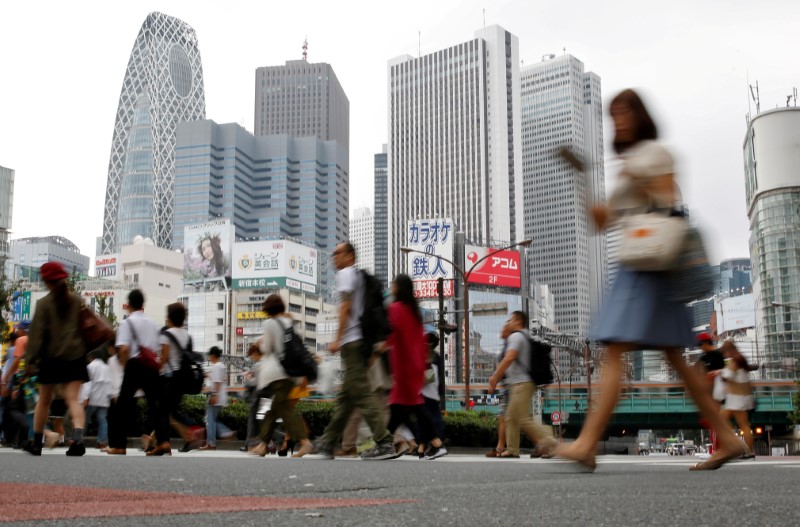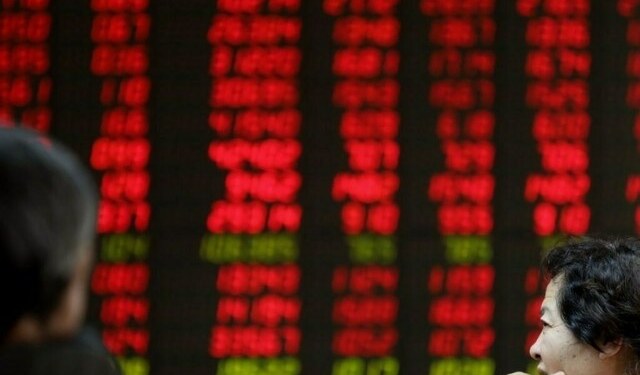 © Reuters. FILE PHOTO: People cross a street in front of high-rise buildings in the Shinjuku district in Tokyo
© Reuters. FILE PHOTO: People cross a street in front of high-rise buildings in the Shinjuku district in TokyoBy Tetsushi Kajimoto
TOKYO (Reuters) – Nearly three-quarters of Japanese companies expect the economy to keep expanding at least another year, extending an already strong run, although they were not as bullish as market estimates, a Reuters poll showed.
Japan has logged seven straight quarters of economic expansion to end-September, its longest uninterrupted stretch of growth since 1994. Tokyo stock prices are at their highest in 26 years while quarterly data shows corporate profits are near an all-time high.
But roughly half of firms expect the economy to stop expanding by the middle of next year with that number rising to 71 percent for predictions to end-2019. A planned sales tax hike, the petering out of public works spending related to the Tokyo 2020 Olympics as well as a deepening labor shortage were cited as impediments to future growth.
Their outlook also came with other key caveats.
Most firms do not believe that the recovery is self-sustaining – instead dependent on Olympic-related spending – and they don’t believe it will become self-sustaining soon. They also see no decisive end to deflation this year, the Reuters Corporate Survey, conducted January 4-17, showed.
“Olympic-related demand will come to an end, and then we are going to have some temporary stagnation due to the hike in the sales tax,” wrote a manager of an auto-related firm in the survey who forecast a halt to economic growth by mid-2019.
(GRAPHIC- Japan firms predict how long economic growth will last – http://reut.rs/2DpmhzU)
By contrast, economists are far more upbeat.
A Reuters poll in December showed 20 of 33 economists polled projected the economic expansion would continue until the end of 2020 or beyond, while 11 expected it would halt in the second half of 2019. Just two said it would end in the first half of 2019.
The Reuters Corporate survey, conducted monthly for Reuters by Research, polled 547 big and medium-sized firms with managers responding on condition of anonymity. Around 240 answered the questions on growth and deflation.
“Japanese firms may be seeing the current expansion as merely cyclical, which does not necessarily mean self-sustaining growth or an exit from deflation,” said Masaki Kuwahara, senior economist at Nomura Securities, who reviewed the survey results.
“The deflationary mindset is deeply entrenched, particularly among service-sector companies.”
Japan has only managed very mild inflation since Bank of Japan Governor Haruhiko Kuroda embarked on an unprecedented burst of money printing in April 2013.
Core consumer prices rose 0.9 percent in the year to November – less than half the inflation target after nearly five years of super-easy monetary policy and “Abenomics” pro-growth measures.
In the survey, only 14 percent of firms said they believe Japan is already out of deflation. Some 40 percent – the biggest proportion – said they see no end to deflation for the foreseeable future. That was, however, much lower than the 70 percent of firms who answered a similar question in a 2016 Reuters Corporate Survey.
Asked about how the central bank should best steer monetary policy, the January survey found just 6 percent want further easing, while the rest were split on whether the BOJ should maintain policy or move towards an exit from easy money.
The respondents were also evenly divided on whether the BOJ should keep negative interest rates.
“You cannot expect a big impact from further easing. If that’s the case, we prefer the status quo,” wrote a manager at a paper/pulp maker.
Two-thirds of companies also said they want Kuroda to be reappointed governor when his five-year term ends in April, with many citing the need for policy continuity as well as Kuroda’s responsibility to unwind the stimulus he launched. He is widely expected to be reappointed.
Source: Investing.com





























